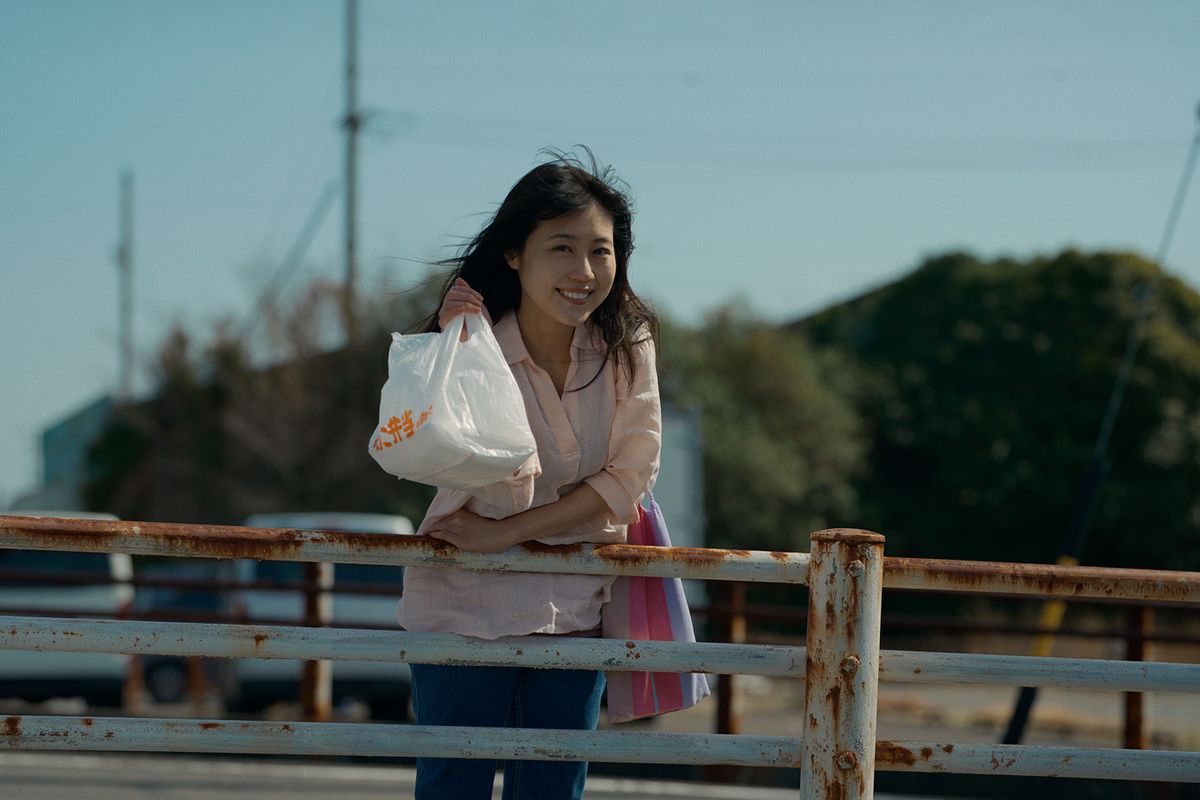A lovely, low-key drama about benevolence and loneliness, "Call Me Chihiro," is as charming as its title character. Chihiro (Kasumi Arimura) is a former sex worker who is now taking orders at a bento shop in a small Japanese town. She is first seen petting a cat, which illustrates her caring nature. When she happens upon kids teasing a homeless man (Keiichi Suzuki), she defuses the situation and offers the stranger food as well as a bath. He silently thanks her for her generosity.
Chihiro is unfailingly nice and polite — she practically kills folks with her kindness — and this is what makes the film's characters (as well as viewers) appreciate her and her good will. Director/cowriter Rikiya Imaizumi does not see his story as a morality play or as a redemption tale (though one could certainly read it those ways); rather he is showing the impact one compassionate individual has on everyone she meets.
Chihiro reads people well, and her skill to bring others out of their shells and make them feel less lonely is endearing. It may be a talent she developed in her past — her colleague Nagai (Toshie Negishi) claims her sex work is why she flirts with the male customers at the bento shop — but she is putting her skill to good use.
As this leisurely paced film shows, she has a disarming way of connecting with folks. Okaji (Hana Toyoshima) is a schoolgirl who secretly takes pictures of Chihiro, and is intimidated by her at first, but Chihiro befriends Okaji and using a treasure map to introduce her to another student, Bechtin (Itsuki Nagasawa), who shares Okaji's love of manga.
Chihiro also visits Tae (Jun Fubuki), the wife of the bento shop owner, who is in a hospital receiving care for blindness. As she and Tae fold origami and talk, their conversations are touching. One especially poignant scene that occurs late in the film, has both characters sitting in a car, evaluating their lives.
Furthermore, Chihiro's exchanges with Basil (Van), a friend from her past, and Utumi (Lily Franky), her boss from her work in a massage parlor, provide convivial moments that are tender and intimate.
Perhaps Chihiro's most meaningful friendship is with Makoto (Tetta Shimada), a young boy who initially teases and fights with Chihiro. She sees his acting out as a need for attention and calms him with food. Eventually she has Okaji help Makoto with his schoolwork. Alas, Makoto's mother, Hitomi (Yui Sakuma), does not welcome Chihiro's charity, and berates her for it. Chihiro's response is to bow and apologize — such is her considerate disposition. While viewers understand the motivations of each character's behavior, the film wisely never overplays these scenes. The delicate emotions are rendered without melodrama or excess.
Much of "Call Me Chihiro" unfolds episodically, with the action mainly consisting of the characters meeting, eating and talking. Food is often Chihiro's way into developing a friendship. Her joy at eating pickled plums or bamboo shoots is effusive, and she is almost always providing a bento meal for a character. (All the food throughout the film looks appetizing.) However, some of the more dramatic scenes feature Okaji dining with her family where the mood is tense. When Chihiro shares some food with Okaji, she senses her friend's discomfort and explains that even the best cooking can be tasteless if not served in a pleasant environment.
This concept is one Imaizumi takes to heart. "Call Me Chihiro" is a bright film and it has such an affable quality (like its protagonist), it is hard not to fall under its spell. When Chihiro expresses an idea shared from one of her former clients — "We are all aliens from different planets" — it is sweet, and it reflects the very diverse group of individuals orbiting her in this seaside town. They all come together – for a meal of course – in one of the film's most relaxed hangout scenes.
Want a daily wrap-up of all the news and commentary Salon has to offer? Subscribe to our morning newsletter, Crash Course.
However, despite all the gracefulness in the film, Chihiro's character is a bit underdeveloped. There is a hint from Basil that someone from Chihiro's past is looking for her, but this is mentioned once and never brought up again. It could be Chihiro's estranged brother, whose conversation with her reveals something about her family. There are only a few scenes depicting Chihiro's backstory, with one, involving a woman (Miwako Ichikawa), that fills in a few blanks, but these scenes also raise as many questions as they answer.
Likewise, a contemporary sequence has Chihiro entering a restaurant where a customer is berating the staff provides an awkward moment before Chihiro picks up another diner for sex. While Chihiro claims that she does not want love, this aspect of the film and her character, could have been explored more. Her loneliness may be palpable when she gazes at the moon in one scene, but mostly Chihiro comes off as well-adjusted because of her many friendships; one may quibble that she is the most unjaded former sex worker in cinema history.
As Chihiro, Arimura gives a sensitive performance, and she is ably supported by the uniformly strong ensemble cast, although some characters, like Bechtin, are underwritten.
Overall, Imaizumi creates a nice vibe that allows the film to calmly float along while it emphasizes the value of human connections. "Call Me Chihiro" is like a warm hug that embraces viewers who will easily come to care for and connect with its easygoing characters.
"Call Me Chihuro" is currently streaming on Netflix.
Read more
about movies and TV featuring sex workers

Shares